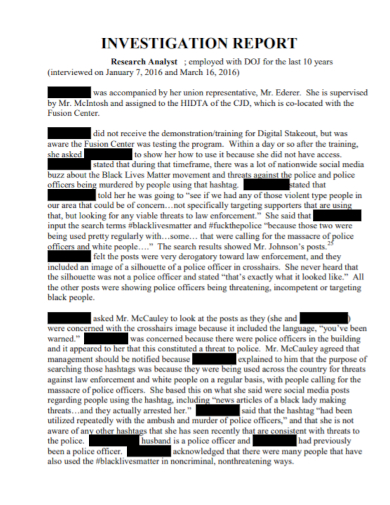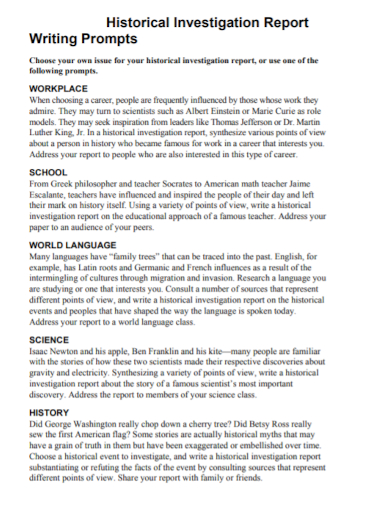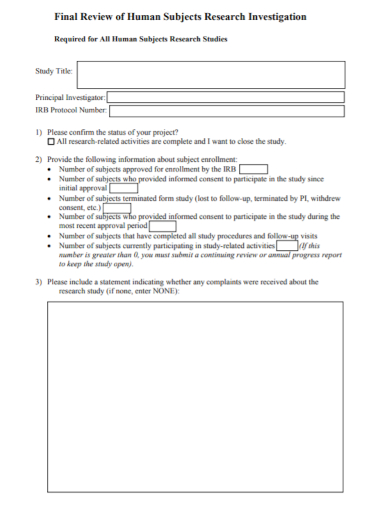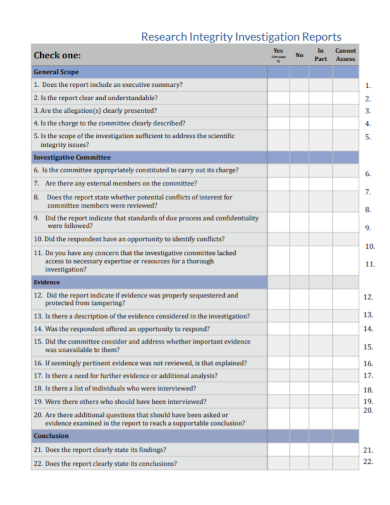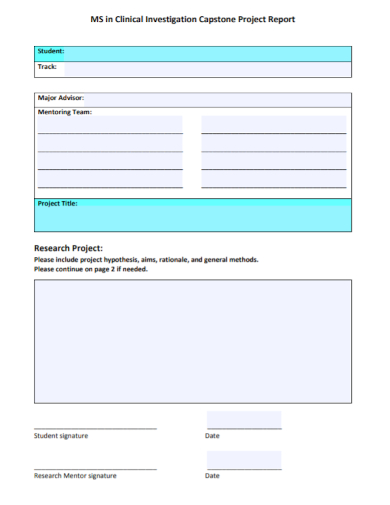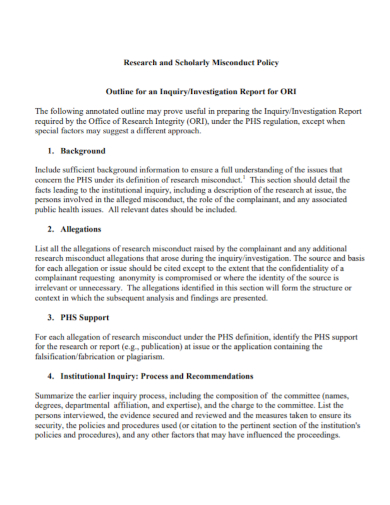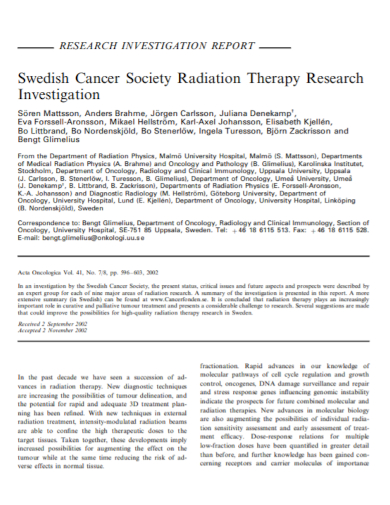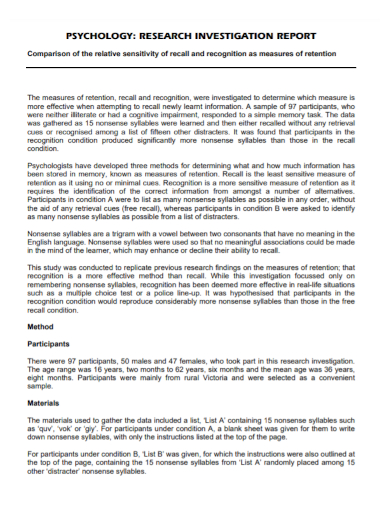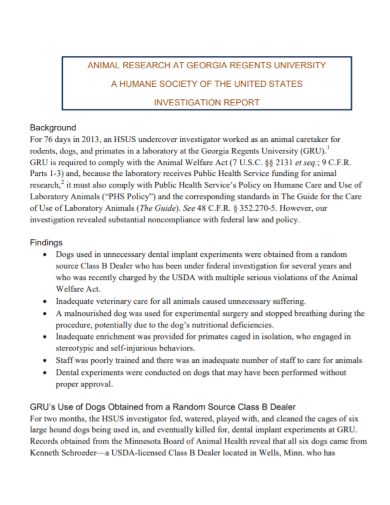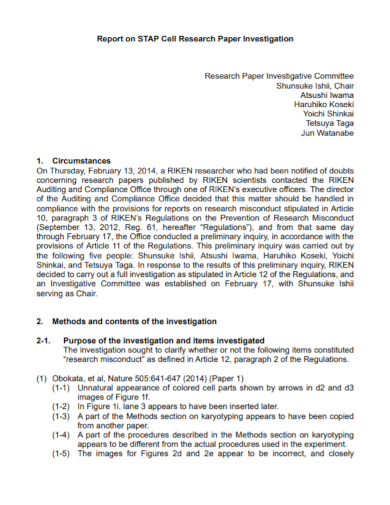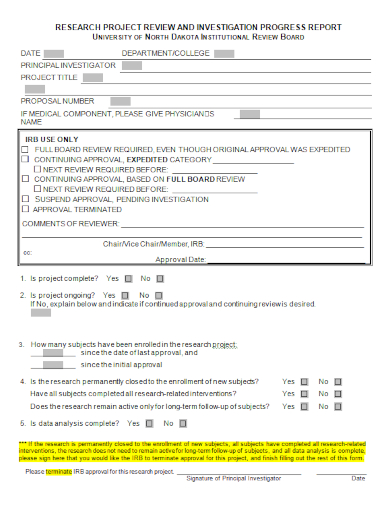10+ Research Investigation Report Samples
Research has always been a part of student’s life since the moment they would need to step up into the field of knowledge generation and knowledge development. With this, different research methods, research ideas and other articles/ studies related to that are made known to help students, as well as field practitioners make their work more ease and easier. With this, research investigations are essential part of the research process, it reveals the answer to what the research problem is. With the importance of this part, there must be a Research Investigation Report that should be carefully crafted and utilized for. In making this, you don’t need to make this from the very scratch, our site offers you ready-made yet customizable sample templates that you can choose from. Just browse among these templates and choose the one that satisfies your needs the most.
For other report template needs, our site offers templates like Monthly Status Report, Project Weekly Status Report, Weekly Construction Progress Report, Individual School Report, Problem Solving Report, Daily Sales Report, Action Research Report, Construction Feasibility Report, Network Feasibility Report, etc. Our article does not only give you free and ready-made templates but also provide you with ideas that are essential in making one. So what are you waiting for? Come! Read the article with me.
1. Research Analyst Investigation Report
2. Historical Research Investigation Report
3. Research Investigation Progress Report
4. Research Integrity Investigation Report
5. Research Clinical Investigation Project Report
6. Research Policy Investigation Report
7. Radiation Therapy Research Investigation Report
8. Psychology Research Investigation Report
9. University Research Investigation Report
10. Research Paper Investigation Report
11. Research Project Review Investigation Report
Why Research?
Research begins when we want to know something. Research is concerned with increasing our understanding. Research provides us with the information and knowledge needed for problem solving and making decisions.
Research is sometimes divided into pure (or basic) and applied research in order to make a distinction between research that is carried out to further our knowledge and that which seeks to apply pre-existing knowledge to real world problems. Our focus here is applied research for decision-making for public policy. In this context the purpose of research is ‘problem solving’.
Roles of Information, Knowledge and Power
Behind the list of problem-solving activities or research functions is a set of very important social and political questions about who is involved and who is in control at each stage.
- Who identifies problems?
- Who diagnoses causes?
- Who identifies potential solutions?
- Who decides on action?
- Who monitors and evaluates action and outcomes?
These questions emphasize the central role of decision-makers in decision-making. This may seem rather obvious, but it is important to recognize that different people have different objectives, different information, different views of the world, different access to resources and power. Research for policy is therefore far from being a neutral, objective process.
Current observations, knowledge, and policy concerns therefore tend to influence both the selection of topics to be researched and the way that they are researched. How may this relationship between policy and research limit the benefits of research for policy-makers? How may this relationship between policy and research pose problems for researchers?
Research can limit policy change or stimulate it. Thus if current policy sets the agenda for research, then research that conforms to the broad objectives and assumptions of current policy and uses easily available data may not ask enough questions to challenge the fundamental approach of policy. It may then promote more effective design and implementation of an ineffective or inappropriate policy, without questioning the policy or looking for alternatives. This is an important danger that researchers must be aware of. We sometimes need to question basic assumptions, and break out of the ‘box’ of current thinking. Political currents and pressures, the demands of clients willing to fund research, ‘fashions’ in development thinking, an emphasis on technology or modernization, our own experience, and the availability of data and information can all, consciously or unconsciously, strongly affect our choice of problems to research and the questions we address in our research. This is a danger that all researchers have consciously to guard against.
FAQs
How is research a process of investigation?
Some of the common ways investigative research methods are literature searches, communicating with people, focus group discussion, personal interviews, telephonic surveys, electronic mail surveys, mail surveys, and internet surveys.
What are the types of research investigation?
Scientists use three types of investigations to research and develop explanations for events in the nature: descriptive investigation, comparative investigation, and experimental investigation.
You might find yourself getting caught up in the report that you are making especially that you’ve got to do it from the very scratch. With this, it is highly encouraged of you to make available all the resources you can find online. What are you waiting for? Avail our templates in SampleTemplates now!
Related Posts
FREE 10+ Investigation Plan Samples
FREE 10+ Science Research Report Samples
FREE 10+ Primary Research Report Samples
FREE 10+ Investigation Checklist Samples
FREE 10+ Fire Investigation Report Samples
FREE 9+ Sample Technical Reports
FREE 9+ Investigation summary Samples
FREE 8+ Investigation Summary Report Samples
FREE 8+ Workplace Investigation Report Samples
FREE 3+ Journal Report Samples
FREE 43+ Report Examples
FREE 10+ Scientific Research Report Samples
FREE 10+ Fire Accident Report Samples
FREE 10+ Executive Summary Report Samples
FREE 9+ Sample Background Reports

